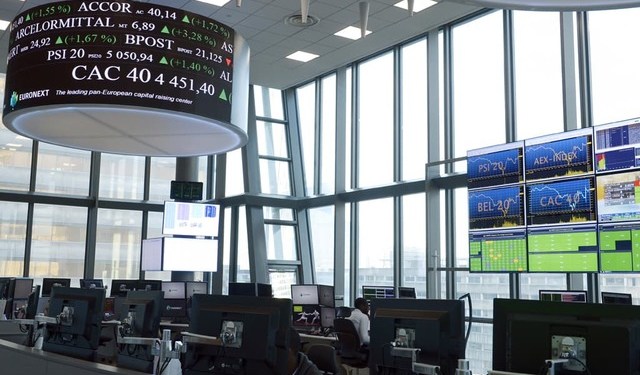Informist, Friday, Feb 23, 2024
–Mkt sources: CCIL may enable FPIs’ gilts trade via global platforms
–Mkt sources:CCIL creating trade interface with global bond platforms
–Mkt sources: RBI, mkt discussed CCIL interface with global platforms
–Mkt sources: CCIL interface to result in seamless trading for FPIs
–Mkt sources: CCIL interface may give FPIs access to ASTROID platform
By Pratigya Vajpayee and Aaryan Khanna
MUMBAI/NEW DELHI – Clearing Corp of India Ltd is in the process of developing an interface between its gilt trading platform and international trading platforms to give foreign investors an easier access to the domestic debt market, four people familiar with the development said. The Reserve Bank of India, which is the market regulator for government bonds, is in talks with three major international electronic platform providers for fixed income markets: MarketAxess, Tradeweb, and Bloomberg, the people said.
CCIL is working on an application programming interface that would enable foreign portfolio investors to access the domestic bond market using these international electronic trade platforms. For this, the RBI has held consultations with select market participants over the last few months, the people familiar with the development said.
An email seeking comment from the RBI remained unanswered at the time of publishing this story. CCIL also did not respond to queries.
Electronic trading platforms allow investors to place orders for financial instruments with an intermediary such as a broker or, in this case, custodian. The proposed interface will lead to seamless execution and reporting of trades by foreign investors, which is much-needed because the volume of trades by FPIs is expected to soar once India is formally included in global bond indices.
With the help of the interface, foreign investors will be able to seek quotes for buying or selling Indian bonds using the global trading platforms. A mechanism under consideration is that the FPI query will automatically flow to the Request for Quote module of the RBI’s Negotiated Dealing System – Order Matching platform that is hosted by CCIL, where domestic market players will be able to respond to it, the people in the know said.
The settlement of trades will be done by CCIL. This is despite a long-drawn push by FPIs for settlement on offshore platforms such as Euroclear, which would have spared them the need to undergo the stringent know-your-customer checks mandated in India.
The interface will also allow FPIs to access ‘ASTROID’, CCIL’s platform for interest rate swaps, the people in the know said. While FPIs can currently operate a web version of NDS–OM, there is no equivalent of it for swap trading.
FPI participation in the gilt market has increased since September, when JP Morgan announced its decision to include India in its Government Bond Index–Emerging Markets suite. FPI activity is expected to rise even more once the actual index inclusion happens, which will be over a 10-month period starting Jun 28.
Since the index inclusion announcement on Sep 21, FPIs have net bought Indian gilts worth 727.23 bln rupees or around $8.8 bln, and market participants expect foreign fund flows of $25 bln-$30 bln when India is formally added to the JP Morgan index. The index is rebalanced on the last working day of each month. Greater asset allocation to Indian debt is going to result in increased trading by FPIs, with large spurts expected around index rebalancing dates, dealers said.
Of the three global trading platforms that the RBI is in talks with, MarketAxess has the largest market share of bond trading in Asia, dealers said. The platform providers have also been in talks with various players in the domestic market for adopting their product as the primary workflow for gilt trades, they said.
MUCH NEEDED
The voice-trading mechanism, through which FPIs currently conduct bulk of their transactions, may not be equipped to deal with the sheer volume of FPI trades that is expected because of the index inclusion. At present, FPIs in India mostly trade by placing orders with custodian banks, who direct these to their respective trading desks. After the trades are executed, the custodians report them on the NDS-OM platform. The process is not only cumbersome, but also poses trading costs due to the delay in execution, especially across timezones.
The web version of NDS-OM is available to FPIs, but also poses challenges. Trade execution through web NDS-OM depends on grant of access and limits imposed by custodians, which still has challenges such as margin maintenance and foreign exchange conversion. The lack of direct access also requires FPIs to give trading instructions to custodians, which reduces workflow flexibility and kills the spontaneous aspect of trading, dealers said.
Although the proposed integration with global platforms will address the long-standing grouse that FPIs have had about the tedious trading process in India, the timeline for developing the interface and making it operational could be rather long. Depending on the form it takes, the integration may require significant operational and even regulatory changes, which could take anything between a few months to around one year, market participants said.
“As of now, the planning is only on paper. The execution will take a while, but the proposal is being worked upon steadily and at a good pace,” a market participant who is a part of the discussions said.
In its Statement on Developmental and Regulatory Policies on Feb 8, the RBI had said that market makers have made requests to access offshore electronic trading platforms or ETPs offering permitted rupee-denominated products. The central bank had then said it would review the regulatory framework for these platforms, and will issue a revised regulatory framework for public feedback.
“Under the (existing) framework, which aimed to ensure fair access through transparent, safe, and efficient trading processes, robust trading infrastructures and prevent market abuse, thirteen ETPs operated by five operators have since been authorised,” the RBI had said in its statement.
“Market makers have also made requests to access offshore ETPs offering permitted Indian Rupee (INR) products.”
The RBI is yet to release the draft framework for public feedback. Before CCIL can roll out the integration, the RBI will have to ensure that the checks and balances regarding know-your-customer and anti-money laundering are watertight, but not prohibitive.
And now that FPIs will comprise a larger share of the Indian market, it is also time to address the information asymmetry inherent in FPI trades. Currently, domestic market players have an information disadvantage compared with the custodian foreign banks who process FPI trades. The streamlining of FPI trades is a long-pending market reform, and while the RBI is at it, it would do well to give domestic market participants real-time visibility on foreign investor activity, dealers said. End
US$1 = 82.94 rupees
Edited by Ranjana Chauhan
For users of real-time market data terminals, Informist news is available exclusively on the NSE Cogencis WorkStation.
Cogencis news is now Informist news. This follows the acquisition of Cogencis Information Services Ltd by NSE Data & Analytics Ltd, a 100% subsidiary of the National Stock Exchange of India Ltd. As a part of the transaction, the news department of Cogencis has been sold to Informist Media Pvt Ltd.
Informist Media Tel +91 (22) 6985-4000
Send comments to [email protected]
© Informist Media Pvt. Ltd. 2024. All rights reserved.
Source: Cogencis


























